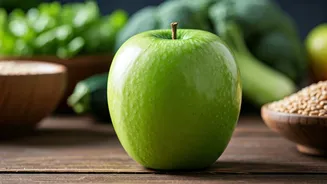Introduction to HDL
High-Density Lipoprotein, commonly known as HDL cholesterol, is often referred to as 'good cholesterol' due to its vital role in cardiovascular health.
HDL works by removing harmful cholesterol from the arteries and transporting it back to the liver, where it can be processed and eliminated from the body. Maintaining optimal HDL levels is essential in reducing the risk of heart disease and stroke. Elevated HDL levels indicate a lower risk, making it crucial to focus on dietary choices and lifestyle adjustments that can naturally boost these levels. Focusing on a diet rich in certain foods can significantly contribute to a healthier heart and improve overall well-being. This guide highlights seven such foods that are easy to incorporate into daily life, particularly within the Indian context.
Olive Oil's Power
Olive oil, a staple in many Indian kitchens, is rich in monounsaturated fats. These healthy fats are known to increase HDL cholesterol levels, offering significant benefits for heart health. Regular consumption of olive oil can help reduce the levels of LDL (bad) cholesterol, preventing the build-up of plaque in arteries. Using olive oil in cooking, drizzling it over salads, or adding it to vegetables are simple yet effective ways to harness its heart-healthy properties. When choosing olive oil, consider extra virgin olive oil, which is less processed and retains more of its natural antioxidants. These antioxidants protect the heart from damage. Incorporating olive oil into your diet is a delicious and proactive step towards maintaining a healthy heart, contributing to both taste and well-being.
The Goodness of Nuts
Nuts, especially almonds, walnuts, and cashews, are packed with healthy fats, fiber, and antioxidants that contribute to raising HDL cholesterol. Regular consumption of nuts has been linked to improved heart health, primarily through their impact on cholesterol levels. These nuts help decrease LDL cholesterol while simultaneously increasing HDL. In India, nuts are often consumed as snacks or used in various traditional recipes, making it easier to incorporate them into your diet. A handful of nuts a day can make a noticeable difference in your cholesterol profile. They also offer added advantages like providing essential nutrients. For enhanced taste and variety, consider enjoying nuts as part of a trail mix or adding them to breakfast cereals. Choosing raw or dry-roasted nuts instead of those with added salt and sugar maximizes their health benefits.
Avocados: A Superfood
Avocados are rich in monounsaturated fats, much like olive oil, contributing to the increase in HDL cholesterol. Their creamy texture and mild flavour make them versatile for various dishes, including salads, smoothies, or as a spread on toast. Besides raising HDL, avocados also help lower LDL cholesterol. They also offer an array of essential nutrients and antioxidants, further boosting heart health. Despite their relatively high-fat content, the fats in avocados are the healthy kind that support cardiovascular function. Considering the increasing availability of avocados in Indian markets, incorporating them into your diet is becoming easier. The unique nutritional profile of avocados makes them a great food choice for overall heart health and helps improve the well-being of the body.
Fatty Fish Benefits
Fatty fish, such as salmon, mackerel, and sardines, are excellent sources of omega-3 fatty acids, which significantly boost HDL cholesterol levels. These essential fatty acids reduce triglycerides, which is another type of fat in the blood that can increase heart disease risk. Eating fatty fish at least twice a week is recommended for heart health. Omega-3s also have anti-inflammatory properties, protecting blood vessels and reducing the risk of heart attacks and strokes. Fish is a popular part of many Indian cuisines, providing a delicious way to improve heart health. It is advisable to choose fish that are sustainably sourced to ensure you get the maximum nutritional value. Cooking methods like grilling, baking, or steaming retain the most nutrients and health benefits.
Fiber-Rich Oatmeal
Oatmeal, particularly the steel-cut or rolled variety, is high in soluble fiber, which helps lower LDL cholesterol levels. Additionally, soluble fiber can have a positive effect on HDL cholesterol. Starting your day with a bowl of oatmeal is a simple yet effective way to improve heart health. The fiber content helps in regulating blood sugar levels and promotes satiety, helping to manage weight. Oatmeal is versatile; it can be customized with various toppings such as nuts, seeds, and fruits, making it a delicious and nutritious breakfast option. In India, oatmeal can be paired with local fruits and spices for a culturally appropriate and healthful meal. Regularly consuming oatmeal is a simple and beneficial lifestyle adjustment to promote a healthy heart and improve overall well-being.
Legumes and Pulses
Legumes and pulses, including lentils, chickpeas, and kidney beans, are another rich source of soluble fiber, which is beneficial for heart health. These foods are known to lower LDL cholesterol, thereby improving the HDL cholesterol profile. They are low in fat and packed with protein, making them an excellent choice for a balanced diet. Incorporating legumes and pulses into your meals can be easily achieved through various Indian dishes like dal, curries, and salads. These foods also contribute to a feeling of fullness, which can help in managing weight and reducing the risk of heart disease. Furthermore, legumes and pulses are affordable and widely available in India, making them a practical and accessible way to improve your heart health. Regular consumption of these foods is an effective strategy for maintaining cardiovascular health.














